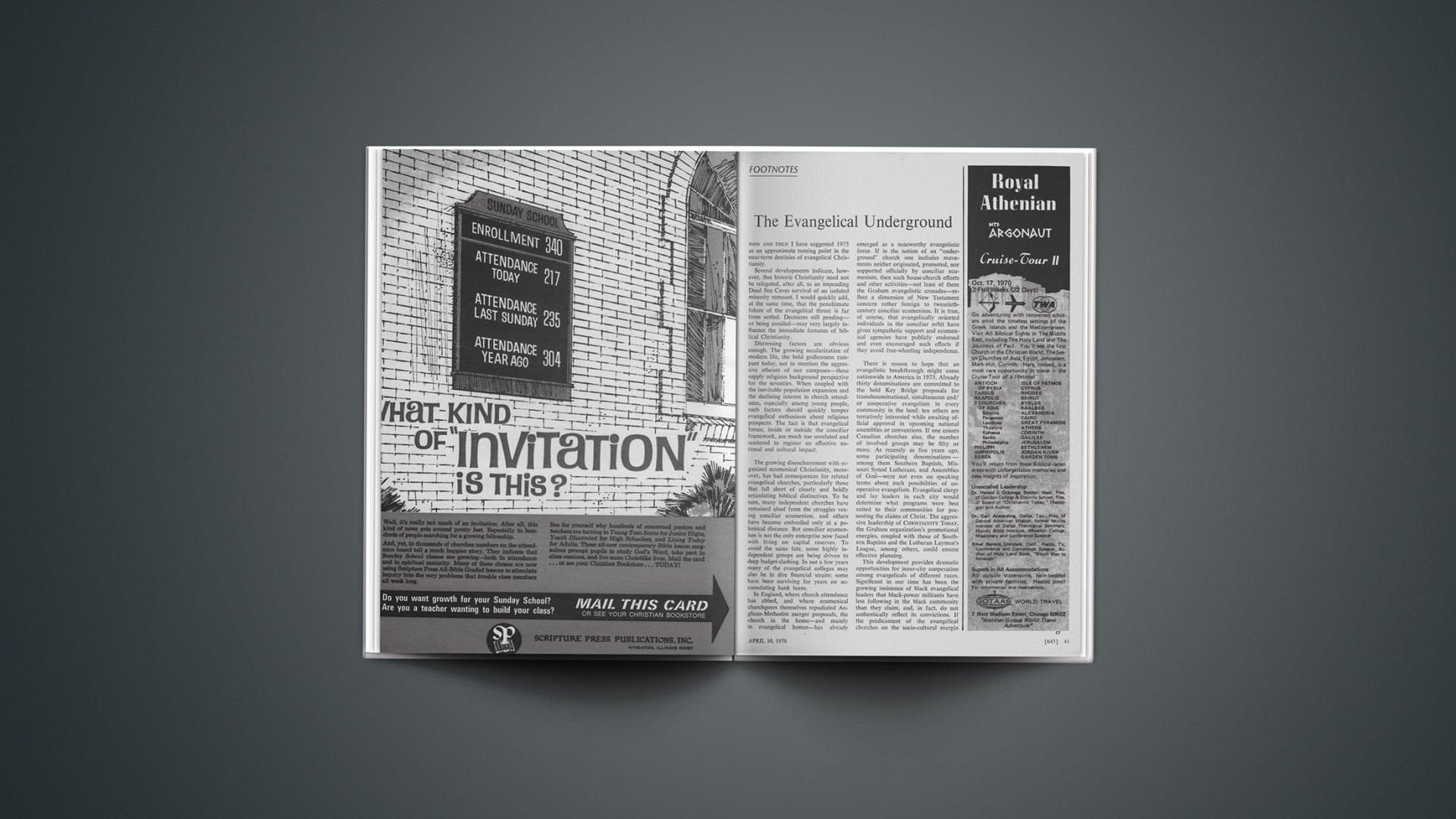Now and then I have suggested 1975 as an approximate turning point in the near-term destinies of evangelical Christianity.
Several developments indicate, however, that historic Christianity need not be relegated, after all, to an impending Dead Sea Caves survival of an isolated minority remnant. I would quickly add, at the same time, that the penultimate future of the evangelical thrust is far from settled. Decisions still pending—or being avoided—may very largely influence the immediate fortunes of biblical Christianity.
Distressing factors are obvious enough. The growing secularization of modern life, the bold godlessness rampant today, not to mention the aggressive atheism of our campuses—these supply religious background perspective for the seventies. When coupled with the inevitable population expansion and the declining interest in church attendance, especially among young people, such factors should quickly temper evangelical enthusiasm about religious prospects. The fact is that evangelical forces, inside or outside the conciliar framework, are much too unrelated and scattered to register an effective national and cultural impact.
The growing disenchantment with organized ecumenical Christianity, moreover, has had consequences for related evangelical churches, particularly those that fall short of clearly and boldly articulating biblical distinctives. To be sure, many independent churches have remained aloof from the struggles vexing conciliar ecumenism, and others have become embroiled only at a polemical distance. But conciliar ecumenism is not the only enterprise now faced with living on capital reserves. To avoid the same fate, some highly independent groups are being driven to deep budget-slashing. In not a few years many of the evangelical colleges may also be in dire financial straits; some have been surviving for years on accumulating bank loans.
In England, where church attendance has ebbed, and where ecumenical churchgoers themselves repudiated Anglican-Methodist merger proposals, the church in the home—and mainly in evangelical homes—has already emerged as a noteworthy evangelistic force. If in the notion of an “underground” church one includes movements neither originated, promoted, nor supported officially by conciliar ecumenism, then such house-church efforts and other activities—not least of them the Graham evangelistic crusades—reflect a dimension of New Testament concern rather foreign to twentieth-century conciliar ecumenism. It is true, of course, that evangelically oriented individuals in the conciliar orbit have given sympathetic support and ecumenical agencies have publicly endorsed and even encouraged such efforts if they avoid free-wheeling independence.
There is reason to hope that an evangelistic breakthrough might come nationwide to America in 1973. Already thirty denominations are committed to the bold Key Bridge proposals for transdenominational, simultaneous and/or cooperative evangelism in every community in the land; ten others are tentatively interested while awaiting official approval in upcoming national assemblies or conventions. If one counts Canadian churches also, the number of involved groups may be fifty or more. As recently as five years ago, some participating denominations—among them Southern Baptists, Missouri Synod Lutherans, and Assemblies of God—were not even on speaking terms about such possibilities of cooperative evangelism. Evangelical clergy and lay leaders in each city would determine what programs were best suited to their communities for presenting the claims of Christ. The aggressive leadership of CHRISTIANITY TODAY, the Graham organization’s promotional energies, coupled with those of Southern Baptists and the Lutheran Laymen’s League, among others, could ensure effective planning.
This development provides dramatic opportunities for inner-city cooperation among evangelicals of different races. Significant in our time has been the growing insistence of black evangelical leaders that black-power militants have less following in the black community than they claim, and, in fact, do not authentically reflect its convictions. If the predicament of the evangelical churches on the socio-cultural margin stems largely from isolationism, then the removal of this remoteness can now be achieved only by prompt reconciliation, through spiritual mutuality between white and black Christians and a spontaneous togetherness in the cause of Jesus Christ.
The great universities, television and radio stations, the major newspapers of our land, are located primarily in the big cities. More and more these cities are becoming meccas for black majorities, a fact that has far-reaching implications for the future of the mass media. If the dynamic for social change seems to issue largely from militants who do not know the regenerating Gospel of Christ and transcendent justice, then greater liaison between black and white evangelicals could mark a less problematical and more promising day. Such free liaison would restore, moreover, and on a transracial basis, those enduring spiritual emphases that have all but faded from the mass-media dialogue of our day.
Discovering their identity at long last, black evangelicals are assuming roles of responsibility for the inner city and raising up an increasingly articulate witness. Some are taking to the streets and to the public arena with a witness for faith, finding a courage for the Gospel that puts their white brothers to shame.
However indispensably central it may be, the evangelistic thrust is nonetheless not enough in the contemporary culture crisis. There has been, and this is only right, a growing sense of evangelical social concern and involvement, though its presuppositions are not always clear nor its direction articulate. CHRISTIANITY TODAY commented editorially that the U. S. Congress on Evangelism (Minneapolis, 1969) put “the call to social involvement … on a personal basis” and “avoided … a major error of the ecumenical movement, that of making the institutional church the agent of social revolution as though that were the mission of the Church” (October 10, 1969, issue). But what are the presuppositions and objectives basic to a biblically oriented thrust? One ecumenical churchman saw in the congress a confluence of the evangelical emphasis on personal conversion and the liberal social gospel. To avoid such misimpressions, evangelicals need to avoid not only a radical ecumenical alternative but also an ambiguous evangelical alternative.
Coming to the fore now are a new breed of “evangelical hippies” who more than any other group seem to bear the clear marks of an underground movement. A later report will deal with what they are saying and doing.
CARL F. H. HENRY










